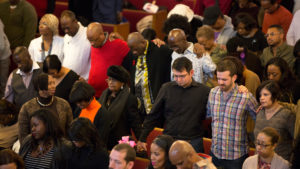I have one request of you. Please hear me out.
The purpose of this article is to cause you to think. Think past the media, society, and people. I want to bring some things to your attention. From there, choose your way.
You and I are believers, correct? Like Jesus, the Bible says that we should be in the world but not of the world (John 17:16).
Regarding the world and politics or political activities, where do we fit as believers?
Understand, I am not trying to stop your political activities, or influence your political affiliations. As I have said, this piece is meant to make you think.
According to Dictionary.com, for context, politics are “the activities associated with the governance of a country or other area, especially the debate or conflict among individuals or parties having or hoping to achieve power.”
God and Politics in 2020
 This year has been a year for the world. I can’t say there is a word that would describe it entirely. Nonetheless, I think we can agree that it will be one to remember. As things have escalated politically with protests, injustices, and elections, as a preacher of the Gospel, I had to seek God on His opinion regarding these matters.
This year has been a year for the world. I can’t say there is a word that would describe it entirely. Nonetheless, I think we can agree that it will be one to remember. As things have escalated politically with protests, injustices, and elections, as a preacher of the Gospel, I had to seek God on His opinion regarding these matters.
I desired to know how politics fits in the Church. I watched the news and saw different Christian leaders separate themselves and stop their congregation’s in-person assemblies for the COVID-19 virus. Then, they reappeared, in person, to deliver speeches and participate in protests about injustice. I watched as many of God’s sheep have been left unattended during one of the most perilous times of my lifetime. I was honestly bothered by this, so like any other matter, I set my heart on seeking God. From there, the Lord pointed out some interesting things to me.
Was Jesus Involved in Politics?
The Lord began to unveil some things to me by starting with the life of Jesus. Recall when Jesus came to earth, His people, the people He was initially sent to, the Jews, were under Roman rule. Other people governed them. Before Jesus could be crucified, Pontius Pilate, a Roman governor, had to have the final say (Matthew 27:11). Although Jesus had broken no laws according to the Romans, the pressures of politics made Pilate consent to crucifying the Lord.
Yet while Jesus was in the earth, He never mentioned or addressed the natural government. He never attempted to liberate the Jews from the control of the Romans. Jesus did, however, talk about The Kingdom of God. He taught the people about the government that was not of this world.
Through the parables, Jesus taught the way of the Kingdom of Heaven. He preached so that people would repent, freeing them from the bondage of sin. His mission was not about uniting people based on color, geographical location, or culture. Jesus’ mission applied to the world, reconciling all who would receive Him back to God.
The Gift of Government in the Church

According to BibleGateway’s King James Version search of the word “government,” it appears 5 times in the Bible.
What I find interesting is that “government” is singular every time except for one. When “government” is in the singular form, often it is referring to the Lord’s government, which is spiritual. Yet, the only time used in the plural form (1 Corinthians 12:28), the word “governments” takes on a different meaning.
I believe that it is plural because whomever the Lord chooses to possess this gift has knowledge of not only the government of God but also the natural government, in which they are in the position to influence the natural government for the benefit of the saints. Throughout the Scripture, we see people operate in this gift. Some examples include David, Joseph, Esther, and Obadiah. These people of God helped the people of God, through their governmental positions in the earth.
Government, Let My People Go!
As I continued to seek God, the Lord then directed me to Exodus and began to show me something else. During this time in which the children of Israel were underneath Egyptian rule, people fail to remember that this change in government saved the people of God. The children of Israel began their time among the Egyptians during Joseph’s lifetime, when he was second in command to Pharaoh. Joseph used his place in the Egyptian government to save His people from the famine.
So, here we have an example of someone in the scriptures using their political position to save the people of God. However, as we continue in the Scriptures, we read of another Pharaoh who did not know of Joseph. He was intimidated by the children of Israel and enslaved them (Exodus 1). This enslavement lasted for many years.
Why would God allow His people to become slaves? I learned many years ago that we, humans, will not always have the understanding and answers to our “whys.” Throughout history, there have been times in which God allowed His people to be afflicted. Sometimes, it was a punishment, but other times it was persecution. Nevertheless, we, as believers, must condition ourselves to accept what God allows, even when it hurts.
The children of Israel did not remain enslaved. God delivered them. Thus we have the famous phrase “let my people go.” But, one doctrinal mistake many believers make is to take a scripture mid-sentence and apply a period. What I mean by that is often, people quote “let my people go…” however, that is not the end of the sentence.
According to the King James Version, the phrase “let my people go” was never used alone, most of the time it read, “And the Lord spake unto Moses, Go unto Pharaoh, and say unto him, Thus saith the Lord, Let my people go, that they may serve me.”
The Lord then began to emphasize to me that it was not only the mere fact that His people were enslaved – it was because they were prevented from serving Him. If people want to see God move, hinder His worship!
Bringing this to today, are the preachers taking a political stance for the motive of ensuring that God be served? I’ll let you answer this for yourself.
So, what’s the play call?
Jesus told us in Matthew 6:33 that the Kingdom of God and His righteousness is what the believer should seek first. This means the government of God should always outrank the governments of this world. If the politics of any natural government cross or disobey the Kingdom of God, we must choose to side with our heavenly administration.
Am I against being politically active? No. I believe that churches and homes should be informed and knowledgeable about what is happening within their government and, if necessary, act. However, I am not at all convinced that the Gospel and political activities are the same. They are two separate entities that may intersect. The Gospel revolves around the government of God, while politics revolves around the government of the land.
Don’t get me wrong – the Body of Christ needs people who occupy positions of power to advance the Kingdom of God. We need those who would fight to legalize what is already spiritually legal. Also, we need those who will contest the laws that dishonor God, His way, and His people.
In all, I think there is much for you and me to consider. God and politics have a thought-provoking relationship. My conclusion? God should be influencing the politics in our lives, not the other way around. I’m sure that may seem like an obvious statement, but my question to you is this: Does God influence your politics, or does politics influence your Kingdom stance?




